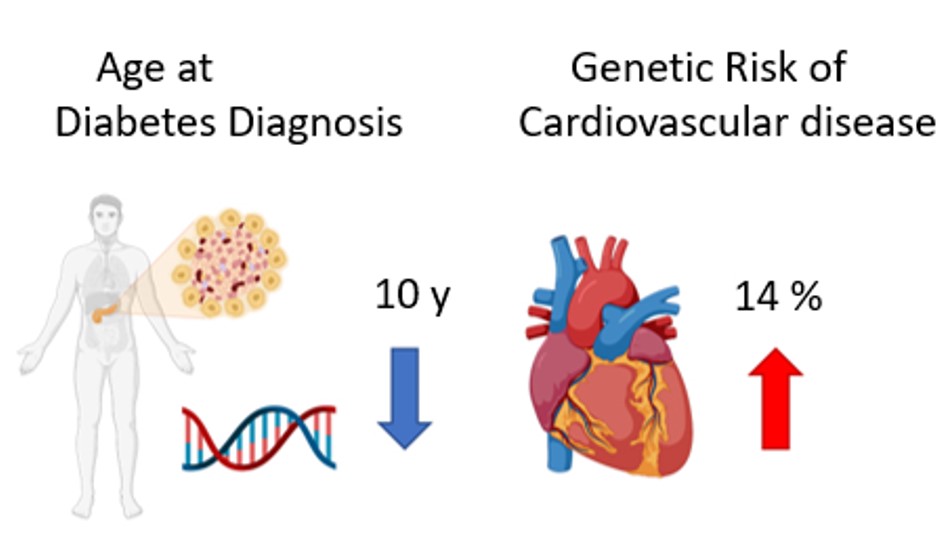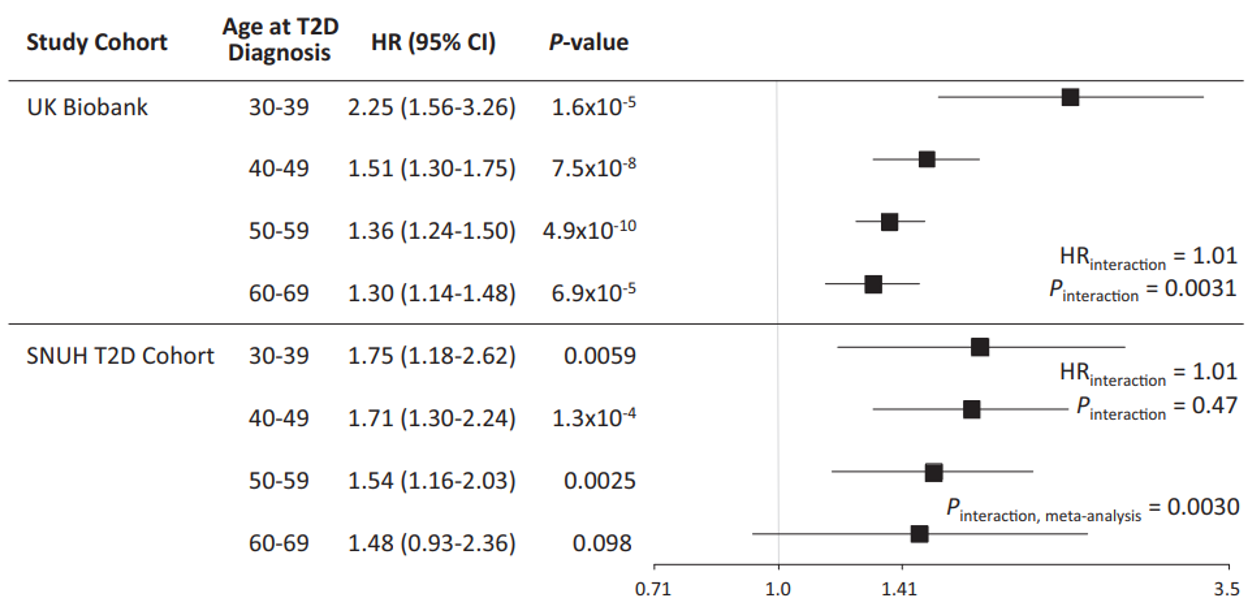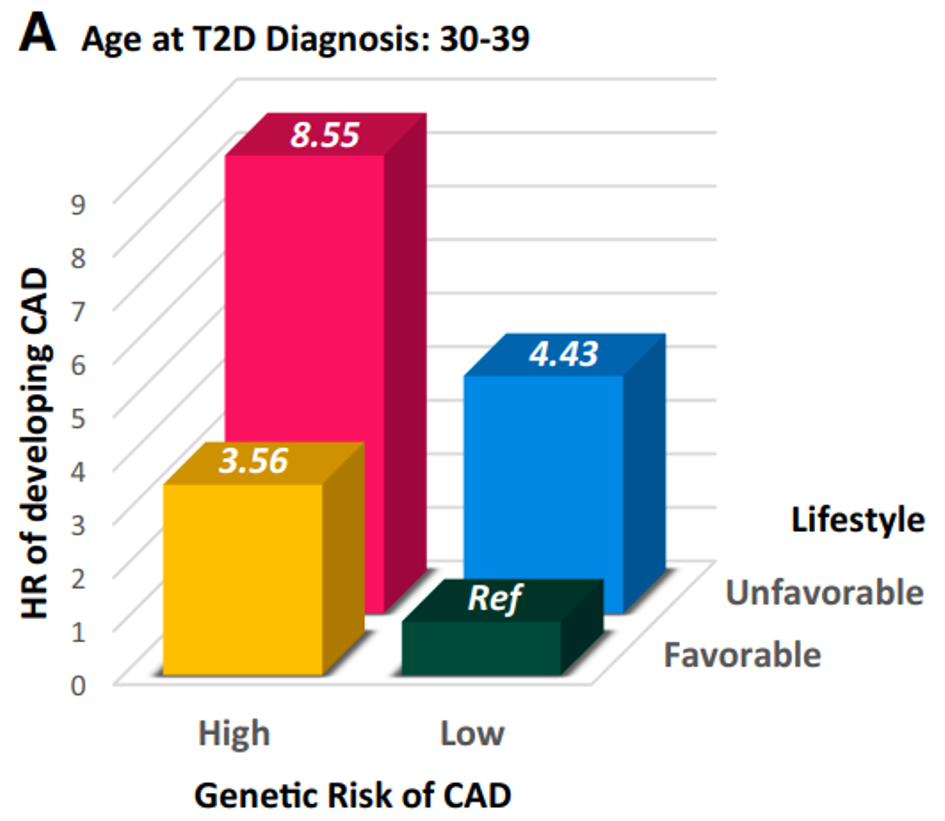Every 10 years earlier that diabetes is diagnosed increases genetic risk of cardiovascular disease by 14%
- The genetic risk of cardiovascular disease increased by 1.73 times When comparing patients diagnosed with diabetes in their 30s and 60s,
- The earlier the onset of diabetes, the greater the genetic influence on cardiovascular disease
- Diabetic patients in their 30s can lower their risk of cardiovascular disease by following a healthy lifestyle

[Figure 1] Every 10 years earlier the age of a diagnosis of diabetes, the risk of cardiovascular disease due to genetic influence increases by 14%
People who develop adult diabetes in their 30s have a high risk of cardiovascular disease due to genetic influences, but a study has found that the risk can be reduced by maintaining a healthy lifestyle. Adult diabetic patients diagnosed at a young age seem to need to pay special attention to their lifestyle to prevent complications.
On May 19th, a research team led by Prof. Kwak Soo Heon, Prof. Park Kyong Soo, and Dr Lee Hyunsuk from the Department of Endocrinology and Metabolism at SNUH presented research which compared the genetic risk of cardiovascular disease in context of the age at diagnosis of diabetes, and the results of analysing the difference in genetic risk according to lifestyle in 13,486 adult diabetic patients in their 30s to 60s.
Adult diabetes (type 2 diabetes) is a disease in which blood sugar levels become abnormally high due to a decrease in insulin function that regulates blood sugar levels. One out of six people in their 30s or older in Korea is a diabetic patient, and the number of patients diagnosed early in their 40s is increasing worldwide due to the recent increase in the obese population.
Diabetes diagnosed at an early age progresses faster and increases the risk of cardiovascular disease complications than when diagnosed at a later age, but the cause of this is unknown.
The research team focused on the fact that genetic factors have a strong effect on the early onset of diabetes and hypothesized that genetic factors would increase the risk of cardiovascular disease in patients with early onset diabetes and conducted a study.
First, the research team analyzed the genes of 12,321 diabetic patients registered in the UK Biobank cohort to identify genetic mutations related to coronary artery disease, a representative cardiovascular complication, and quantify it with a “multigene risk score”. It is known that the higher the score, the greater the genetic risk of developing coronary artery disease.
Afterwards, diabetic patients were followed up for 13 years from age at diagnosis, and the risk ratio (HR), which means 'the size of the genetic effect on the occurrence of coronary artery disease', was confirmed using the polygenic risk score.
As a result, it was confirmed that the risk ratio of coronary artery disease increased by 14% for each 10-year increase in the age of diagnosis. The risk ratio (HR 2.25) of the diabetes diagnosis group in their 30s was 1.73 times higher than that of those in their 60s (HR 1.30).
This result was similar when 1165 diabetic patients registered in the Seoul National University Hospital cohort were followed up for 8 years. In other words, the research team explains that the earlier the diagnosis age of diabetes, the stronger the influence of genetic factors on the actual occurrence of coronary artery disease.

[Figure 2] Generic risk of CAD according to age (years) at T2D diagnosis
Early diagnosis of diabetes increased the risk ratio for coronary artery disease.
In addition, the research team analyzed the risk of coronary artery disease in diabetic patients by age group according to their healthy lifestyles (non-smoking, non-obesity, healthy diet, adequate physical activity).
As a result, when diabetic patients in their 30s with a high genetic risk of coronary artery disease adhered to a healthy lifestyle, they were found to have a similar level to those born with a genetically low risk of coronary artery disease.

[Figure 3] Coronary artery disease risk according to diabetes diagnosis age and genetic risk.
The control group (Ref) was set up as a person with a healthy lifestyle and a low genetic risk.
On the other hand, among diabetic patients in their 30s, those with high genetic risk and unhealthy lifestyle increased the risk of coronary artery disease by 8.55 times compared to those with low genetic risk and healthy lifestyle.
Professor Kwak Soo Heon explained the meaning of this research; “This study is significant because it confirms that ‘genetic factors’ work as a reason for the increased risk of cardiovascular complications in patients with early diagnosis of diabetes. The significance of the study is expected to be realized in the future by analyzing the genes of young diabetic patients to select and early manage high-risk groups for cardiovascular disease.”
Professor Park Kyung Soo said, “Young diabetic patients also need to be aware of cardiovascular disease,” and “We should try to improve our lifestyles, such as proper physical activity, healthy diet, and smoking cessation.”
This study was published in the latest issue of Diabetes Care, the most prestigious international journal in the field of diabetes.

[Pictues from lef] Prof. Kwak Soo Heon, Prof. Park Kyong Soo, and Dr. Lee Hyunsuk from the Department of Endocrinology and Metabolism at SNUH